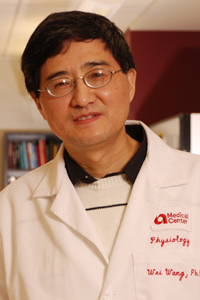 |
Wei Wang, M.D., Ph.D. |
NOTE: This profile is part of a series highlighting the 26 researchers who were named UNMC Distinguished Scientists or New Investigators for 2007. Each of these researchers will be profiled in UNMC Today leading up to a March 20 ceremony to recognize their achievements.
- Name: Wei Wang, M.D., Ph.D.
- Title: Associate professor of cellular and integrative physiology
- Joined UNMC: 1988
- Hometown: Omaha
Briefly describe your research in laymen terms please.
The goal of our research is mainly to explore cardiac functioning in heart failure related diseases.
What led you decide to pursue this area of research?
Heart disease is something that affects so many people in the world and also is a disease that affects many of my close family members. The heart is the center of the body and when that isn’t working properly, everything else is affected. We are interested in comparing the abnormal functioning of the heart with the normal functioning.
How do you see your research contributing to science?
Our research is applicable to better understanding of heart-failure diseases, which will hopefully contribute to further research as well as new treatment approaches and technologies.
Why did you become a scientist?
I knew I wanted to pursue a career that could affect people in a positive way and I also liked the challenge of science. Research is a constantly and quickly evolving and changing area. New innovations, technologies and research findings are evolving everyday, so I am constantly learning.
What is your hope for the next generation of scientists?
My hope is for future researchers to not be afraid of setbacks or failures. I think it is difficult as a young researcher to keep things in perspective and trudge on when an experiment isn’t going your way. I think it’s important for them to know that setbacks are a big part of research and that you learn from your setbacks as well as your successes, and sometimes even more from when things don’t go your way.
Beyond grant funding, how do you measure success?
I measure success by seeing whether I am happy in what I am doing. Am I learning? Am I working alongside passionate and intelligent colleagues? Am I pursuing something worthwhile and that will benefit other people? That’s how I measure success.
What would you tell a student interested in a research career?
Research takes a great deal of patience and determination in addition to creative thought. I think it is important to find a mentor who is passionate and is interested in the same areas that you are. Reading other papers related to your research area about new technologies and theories will better inform your own research and is a very valuable resource. I think that research is a noble and worthwhile career and that if they are truly interested in, they should pursue it. It might be useful to look for internships so they can be exposed to aspects of research and see what doing research is really like.
Do you have a hero/role model? If so, what do you admire most about this person?
My mentor while in graduate school, Dr. Tai Yao from Shanghai Medical University, encouraged me a great deal and also was the one who introduced me to research in cardiovascular physiology. Dr. Irving Zucker, my mentor while completing my postdoctoral studies, remains a great teacher and role model for me.
Tell us about your family and hobbies outside the lab.
My wife and I have been married for 24 years and I have a daughter who is going to graduate college in the spring. I enjoy traveling, music, electronics, fine cuisine and spending time with my family.
List three things few people know about you.
- I like to sing.
- I exercise every single day.
- My favorite food is eggs.